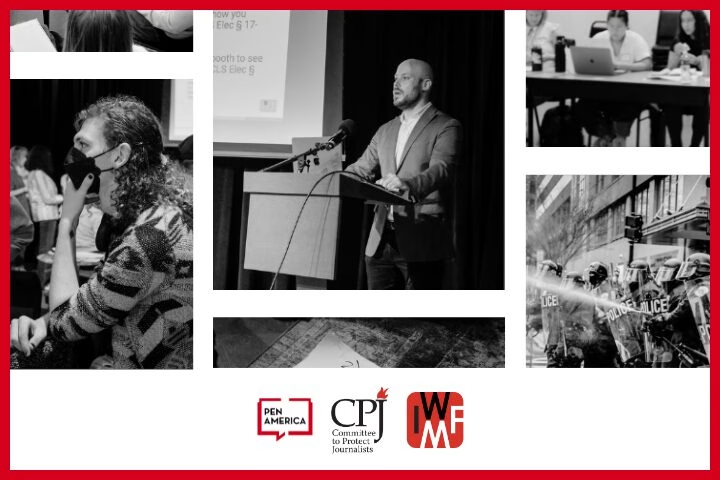U.S. Election Safety Summer

The 2024 U.S. general election comes at a critical time for press freedom in the United States, amid increasing hostilities toward the press and intensifying politically-motivated abuse and violence. Going into a key election year, the U.S. fell 10 spots on the World Press Freedom Index, dropping to 55th in 2024. Journalists in the U.S. are confronting a rise in domestic extremism manifesting in physical and digital attacks, threats likely to increase in the lead-up to the November election.
The Committee to Protect Journalists, the International Women’s Media Foundation, and PEN America teamed up to create a free webinar series that will help journalists prepare for covering the U.S. general election and election-related events. The series provides safety guidance on assessing risk, bolstering digital safety and online abuse defense, ensuring physical safety when covering rallies and protests, understanding the legal rights of journalists, and addressing psychological safety and mental health. Check out the webinar recordings, alongside additional resources, below.
Session 1: Risk assessment and planning for journalists in the field
This webinar, led by Nadine Hoffman of the International Women’s Media Foundation (IWMF), Jeje Mohamed of PEN America, and Jen Byers equips journalists with tools to assess and mitigate risk on their upcoming assignments. This training covers actor mapping, security measures, and other best practices you can implement to lower the risk of potential threats and their impacts. This includes developing communication and check-in protocols for journalists reporting in the field.
Session 2: Online abuse self-defense
Join PEN America’s Viktorya Vilk and Jeje Mohamed for this training designed to equip journalists, as well as their allies and employers, with practical tools and strategies to defend against online abuse. Taking a holistic approach to digital safety, we talk about how to prepare, respond, take care of yourself, and support others in the face of online hate and harassment during the election.
Session 3: Protecting against hacking and doxing
Learn how to better protect yourself from doxing, hacking, and impersonation during a contentious election season. In this interactive workshop led by PEN America’s Viktorya Vilk and Freedom of the Press Foundation’s Harlo Holmes, we show you how to audit your social media accounts, tighten your privacy settings, and track your personal information online so you can maintain the public profile you need to do your job.
Session 4: Legal rights & resources: Covering the 2024 election
This session, lead by Jennifer Nelson and Lucy Westcott, covers journalists’ newsgathering rights when covering elections; issues to consider when reporting at conventions, polling places, or demonstrations; and the range of free resources available through the Reporters Committee for Freedom of the Press and its local partners. Attendees hear from an experienced media law attorney at the Reporters Committee — which has provided pro bono legal support for journalists in every election cycle for the last five decades — and will come away with practical tips and resources that can be shared with their newsrooms.
Session 5: Journalist safety covering the election: Protests, policing and crowds
This training, led by the Committee to Protect Journalists’ (CPJ) Colin Periera and Lucy Westcott, equips journalists with knowledge to safely cover election-related protests, civil unrest, and crowded events. The training focuses on physical safety and includes information on situational awareness, assessing risk, dealing with aggression, police tactics, personal protective equipment, and protest management weaponry.
Session 6: Protecting mental health in the face of online and offline attacks
In an election year where journalists are facing intense pressure, how do we find ways to sustain ourselves from collective burnout? IWMF Next Generation Safety Trainer Rosem Morton discusses how trauma affects journalists in this webinar on navigating mental health and self-care. The IWMF also presents resources available for journalists, including A Mental Health Guide for Journalists Facing Online Violence, created by mental health professionals specialized in working in trauma and the media.
Additional Resources
General Resources
- U.S. Press Freedom Tracker
- CPJ’s journalist safety kit for the U.S. presidential election 2024
- CPJ: Safely covering U.S. election events
- IWMF Emergency Funds
Legal Safety Resources
- RCFP Legal Hotline
- RCFP Election Legal Guide
- CPJ: Guide to legal rights in the U.S.
- RCFP: Police, Protestors & the Press Guide
- RCFP: Reporter’s Recording Guide
- RCFP’s Tips for Covering Protests
- FAW: A Citizen’s Guide to Recording the Police
- NPAA: Practical Advice about Covering High Profile News Stories
Physical Safety Resources
- CPJ’s guide to situational awareness for journalists
- CPJ’s Safety Note on Physical and Digital safety: Civil Disorder
- Risk Assessment and Physical Safety: What every journalist should know
- IWMF top tips for covering protests in a contentious election year
Psychological Safety Resources
- PEN America’s Online Harassment Field Manual, Self-Care
- Right to Be’s Self-Care for People Experiencing Online Harassment
- Without my Consent’s guide on How to Get Help for What I’m Feeling
- The Holistic Security Manual
- Jace Harr’s Interactive Self Care Guide
- IREX’s Tip Sheet for Psychological Self Care for Journalists
Digital Safety Resources
- Combatting Online Abuse: Practical Tips for Journalists
- PEN America’s Online Harassment Field Manual
- PEN America’s Digital Safety Snacks
- IWMF’s Guide to Protecting Journalists Against Online Violence
- Coalition Against Online Violence and Online Violence Response Hub
- IWMF’s Mental Health Guide for Journalists Facing Online Violence
- 1password: Free password manager for journalists
- Free Yubico keys
- Data scrubbing services: Permission Slip (free)
